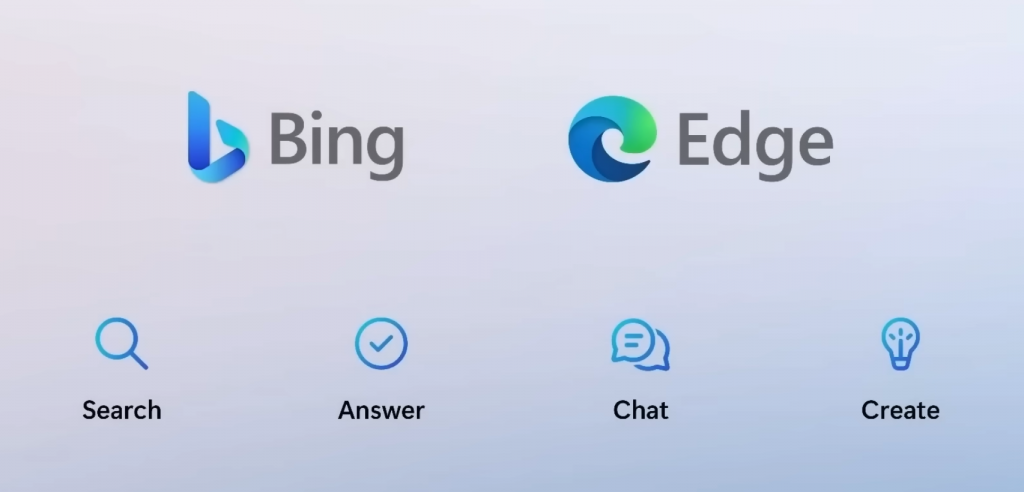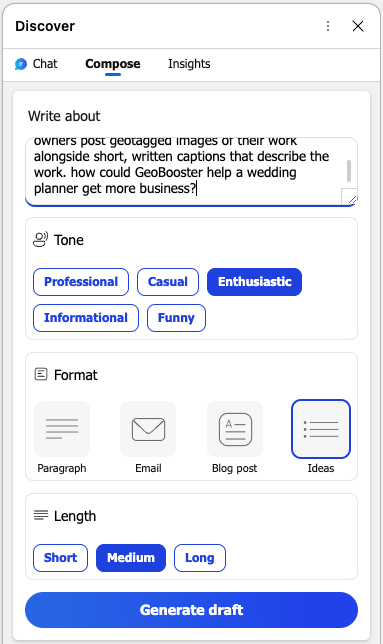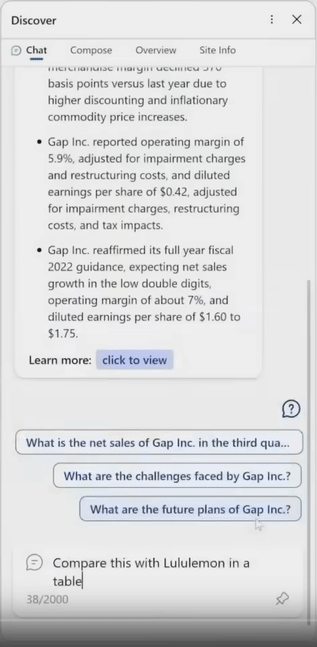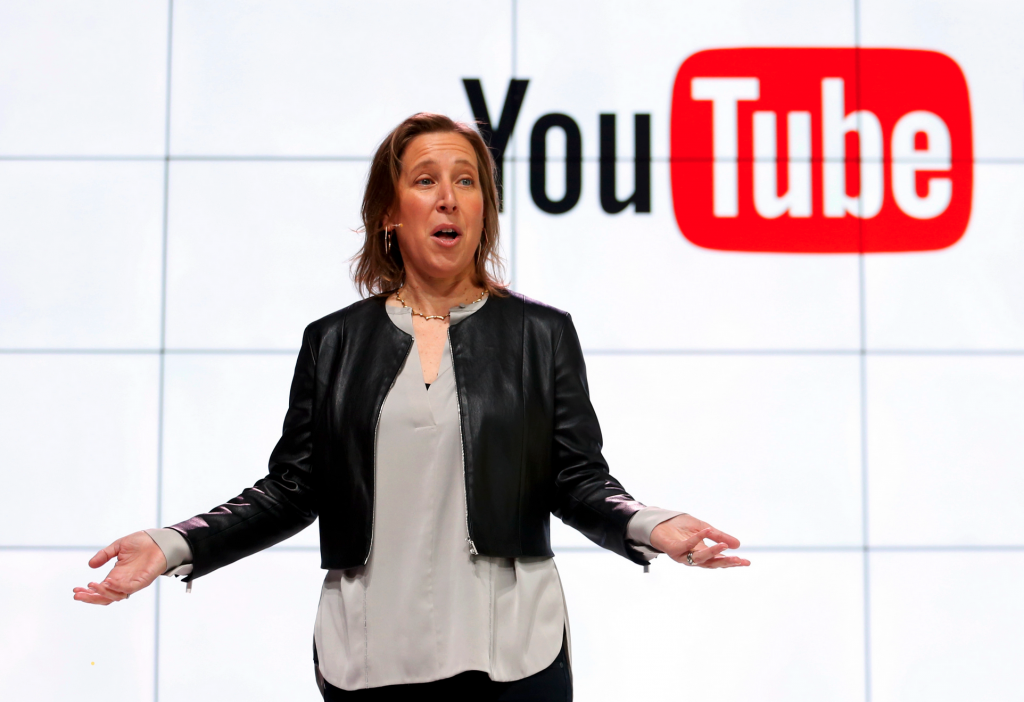Greetings, folks. We’re sorry that last week’s newsletter reached you so late in the day. We had to wait on someone from Mailchimp’s only-available-via-email support staff to reinstate our account after it got suspended by an automated algorithm. We’d love to explain what happened, but that could actually trigger the same outcome. We’ll just say that the incident served as a powerful counterpoint to any argument in favor of giving (contemporary) AI more decision-making responsibilities.
We’re going to tell you all about Microsoft’s new Edge browser this week. We just need to get an announcement taken care of first. Nate’s next AMA is going to be on Wednesday, March 1. He’s going to explain GeoBooster use cases for lots of different industries: home remodeling, landscaping, construction, gyms, tour guides, car dent repair, plastic surgeons, maids, doggy daycare, wedding planners, restaurants, jewelers, HVAC, water damage restoration, vitamin shops– you name it. We have somewhere in the neighborhood of 50 industries that we’ve compiled uses for. We’ll probably have more by the time the AMA rolls around. As always, anyone in attendance will be able to ask questions about whatever they like after the featured talk is over. Register for it here.
All right, so, we went over Microsoft’s new OpenAI-powered Bing search last week. It’s frankly amazing. It’s not yet available to the general public, but anyone with a Microsoft account can sign up for early access here. You can sign up for Edge Dev (their browser where upcoming features get debuted in their beta development stage) preview access through the same link. It’s a package deal.
Microsoft has a checkered web browser history. For years, people joked that Internet Explorer was only useful for downloading another browser. Years before that, Microsoft was ordered to split up into several smaller companies because Internet Explorer’s role as the default Windows browser was considered an antitrust violation. The only thing that saved Microsoft from that fate was a screw-up by the Justice Department– the judge who ordered Microsoft’s dismantling prematurely discussed his ruling with the press. That is the sole reason why Microsoft still exists as a single entity.
Google Chrome is the most popular browser nowadays. Microsoft Edge is better than Chrome by any metric. Edge loads pages faster than Chrome. Edge is more efficient than Chrome– if you have the same tabs open in Chrome and Edge, Edge will use considerably less system resources. Every tech reviewer agrees on this. Despite being the better browser, and despite the fact that all Chrome extensions are compatible with Edge, Edge makes up a tiny percentage of the browser market share. It’s haunted by Internet Explorer’s ghost.
Edge is getting a new set of features that no other browser will be able to match. Not for a while, anyway. The preview version of Edge that we got access to last Wednesday has Microsoft’s high-powered version of ChatGPT built in. You can ask it to compose new text, chat with you, or give you insights into the page you’re looking at.
The chat feature essentially gives you the same experience as using ChatGPT (although OpenAI gave Microsoft a thanks-for-the-eleven-billion-dollars version that’s a lot more capable than standard ChatGPT). The compose functionality is a lot like asking ChatGPT to write something for you. The insights function automatically summarizes any page in a format of your choosing. We’d show you some of the impressive output we’ve received from these new features, but showing people your AI conversations has gotten to the point where it’s about the same as telling someone about your dreams– no one cares, and it sounds like you’re hallucinating nonsense.
The research Edge can do on any user’s behalf is where this browser truly shines. It can look at the content in one of your tabs and make comparisons to information that’s available on the internet. If that sounds a bit abstract, we’ll explain the way Microsoft demonstrated this feature last week.
One of Microsoft’s speakers loaded a 15-page PDF of The Gap Inc’s 2022 Q3 quarterly earnings report. He asked Edge’s chat to give him the report’s key takeaways and was presented with a few, crystal-clear bullet points. While that was cool, and represented an insanely useful way to save time, the real magic happened next. He then asked Edge to compare The Gap’s Q3 earnings to Lululemon’s Q3 earnings. The browser called out to the internet, gathered the right information, imported it, and wrote up a table with side-by-side numbers for comparison.
We have to admit: that was perfect execution by Microsoft (especially in comparison to Google’s demo the following day– they forgot to bring the hardware they needed to show off their competing AI, BARD). To prove that the Edge’s functionality is actually that good, and that the public wasn’t shown a contrived example that was better than anything we’d actually be able to experience in the wild, Microsoft granted every audience member access to the new Bing search and the new Edge browser. Local Viking was given access the next day. We can confirm that Edge is indeed amazing.
Like we said last week, Microsoft’s breakthrough web search and browser are good indicators that Bing is about to get much more traffic than it previously has. Whether that spike will be temporary or sustained is anyone’s guess. You should be getting your clients set up in Bing Places for Business (Microsoft’s equivalent of Google Business Profile) as soon as you can. Get started here.
We applied for early access to Bing and Edge around lunchtime last Tuesday and received an email letting us know we were in before dinner on Wednesday. It seems like we got pretty lucky. No one else we’ve talked to has gotten approved. That shouldn’t deter you from signing up though. Microsoft plans to add millions of users to its new Bing search during February. We linked to the waitlist sign up earlier in this newsletter, but we’ll link to it again now.
We’re pretty cagey about predicting whether or not we’re on the precipice of a new Microsoft-dominated online era. One thing we can point out is that we’ve had AI-powered Bing access for nine days now, but still find ourselves using Google and Firefox most of the time. Old habits die hard, and sometimes superior products don’t get widely adopted. Talk to anyone who bought a Betamax in the 1970s if you want some background on that.
Before we get out of here, it’s worth mentioning that Susan Wojcicki resigned as YouTube’s CEO yesterday. She was Google’s sixteenth employee and had been running YouTube since Google acquired it. Her replacement, Neal Mohan, was her second-in-command for the majority of that time. Mr. Mohan has overseen basically all of YouTube’s recent updates, including the unpopular ones (like removing the dislike count from public view).
YouTube and Google Images jockey back and forth for the title of second-most popular search engine in the world. Really. We can expect a lot of continuity from Mr. Mohan. His job will be to ensure that Google keeps up with the new features that competing video platforms like Twitch, Rumble, and TikTok add, while ensuring that the features that made YouTube popular in the first place are well-maintained. He seems like a well-qualified successor to Mrs. Wojcicki.
We’re looking forward to seeing a lot of you at Nate’s next AMA. We’re also planning to tell you guys about more new Local Viking/Local Brand Manager features next week. Our devs have been working around the clock to crank out some top notch stuff and we think you’re all gonna love the fruits of their labor. We’ll see you next Friday.



